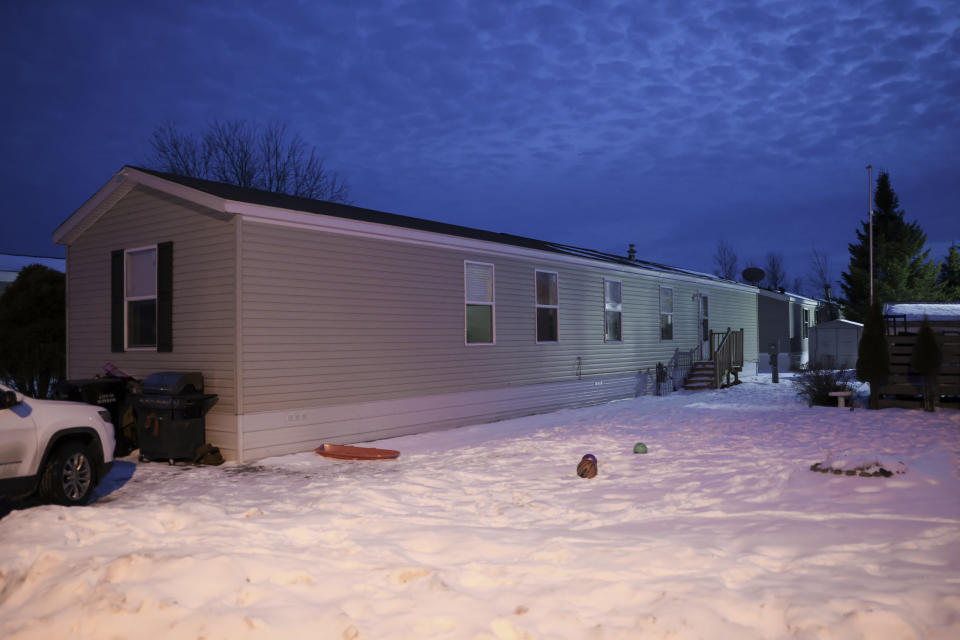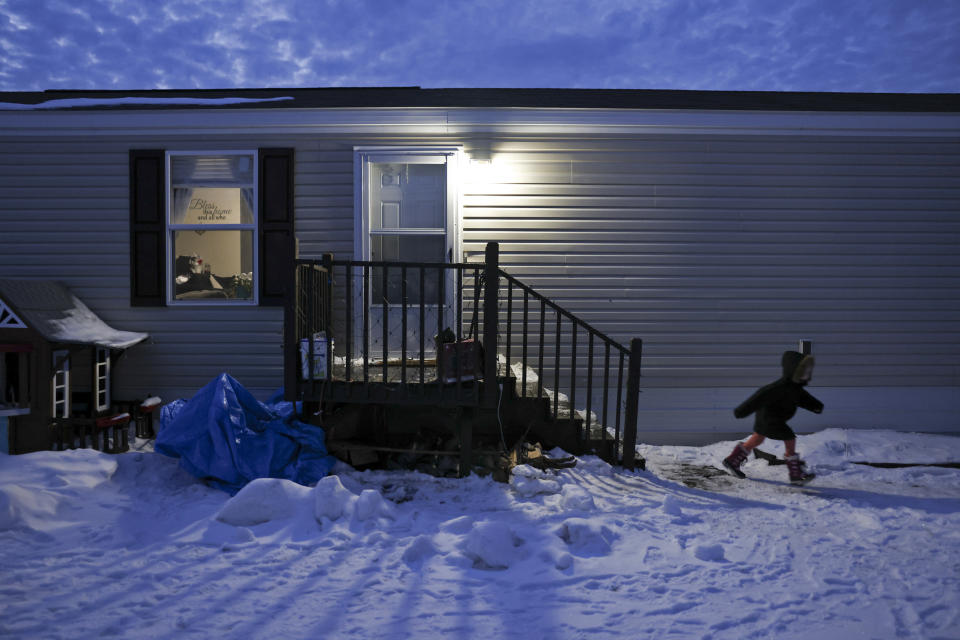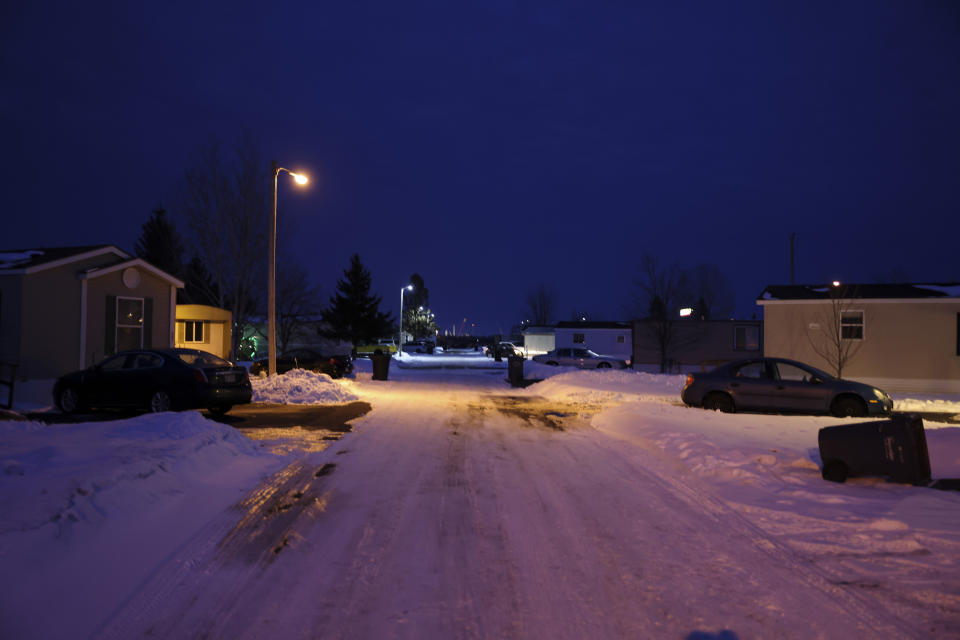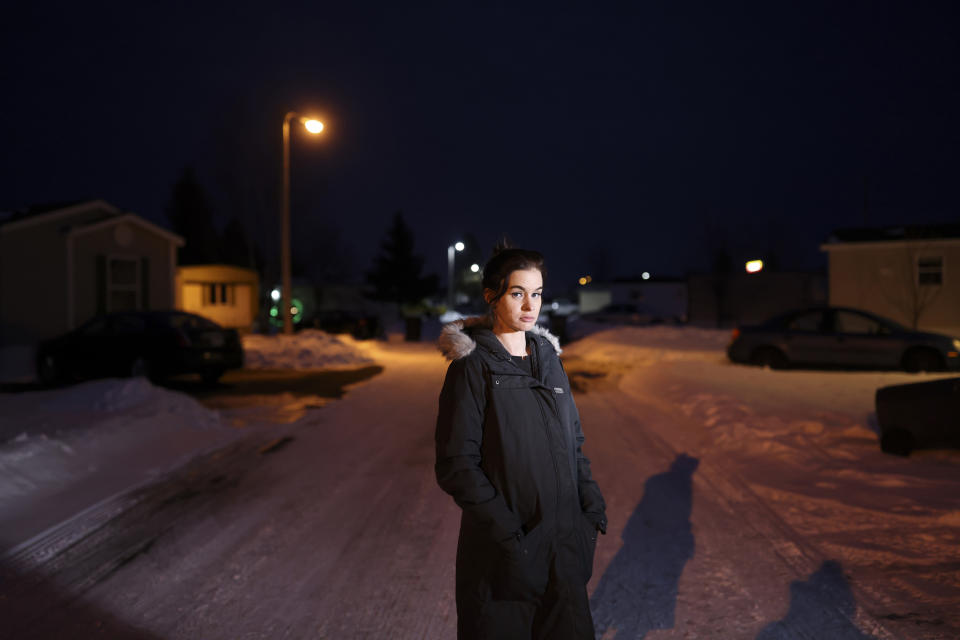Loopholes in CDC's eviction moratorium leave some mobile home dwellers homeless
Chris Larson was preparing lasagna for Christmas Eve dinner last year when someone knocked on the door of the mobile home he owns with his fiancée, Kirsten Brokaw, and three kids in Superior, Wisconsin. An apologetic man dressed in jeans and a jacket stood at the door, handed him a stack of papers and said he was being evicted. He said the family had to leave by Jan. 20.
"We were using up all the money we had to pay down our lot rent," Larson said. "We tried to keep up the best we could until then."
Like hundreds of thousands of other people nationwide, Larson and his soon-to-be wife fell behind on rent last year as the coronavirus ripped across the country. The family's financial troubles began when Brokaw suffered a stroke in March, leaving her unable to work. A couple of months later, Larson lost his job as a truck driver. By December, the family had fallen four months behind on rent and owed more than $4,700 in overdue lot payments, taxes and late fees to the mobile home park's owner, called Homecroft Mobile Home Park, according to court documents reviewed by NBC News.
"I'm going to lose my home over a few months of lot rent," Brokaw said. "I feel like we're losing it all and all the hard work we did that got us to this point."
Homecroft Mobile Home Park, which is listed on the website FostoriaReserve.com as one of its three communities in Ohio and Wisconsin, declined to comment on the case.

Affordable housing advocates have celebrated the Biden administration's extension of the Centers for Disease Control and Prevention's moratorium on evictions as a critical move that could help people fight to stay in their homes as the pandemic continues to gut the economy. But the order includes loopholes that financially stretched landlords have been able to use to remove tenants who fall behind on rent. Housing advocates say one of the hardest-hit groups has been mobile home park dwellers like Brokaw and Larson, who were already surviving with a limited safety net to fall back on. Before the pandemic, many mobile home residents, like Brokaw and Larson, had juggled paying for their mobile homes and for the lots they sat on. When they find themselves facing eviction, they risk losing not only the lot but also their home equity.
"In many cases, the tenant has 30 days to leave the lot. But how do you expect someone to pay a tow company $5,000 to $10,000 to detach their home from the property and reinstall it somewhere else?" said Stuart Campbell, a staff lawyer at Legal Aid of NorthWest Texas, who has been working on a steady stream of mobile home eviction cases through the pandemic. "Oftentimes when they are evicted for lot rent, they're forfeiting the equity on the home. You could lose your home for $1."
Starter homes
Before the pandemic, manufactured homes, the modern term for mobile homes, had become increasingly popular housing options for families with limited means who were looking for the amenities of the suburbs on small budgets, Campbell said. For an average of less than $1,000 a month in most parts of the country, a family can live in a 1,400-square-foot, pet-friendly home with a driveway, a yard and, maybe, a community swimming pool or a park, according to the Manufactured Housing Institute, an industry trade organization. With long backlogs for affordable housing, many families struggling financially have found manufactured homes to be compelling alternatives.
"You get more bang for your buck," Campbell said.
There are 8.5 million manufactured homes in the U.S., nearly 10 percent of the country's housing stock, according to the Manufactured Housing Institute. The median household income of a family living in a manufactured housing park is $30,000 a year, according to the institute.
"There are many determinants on where you live — I want to be close to family, I want to be close to my job," said Kevin Borden, executive director of MHAction, a nonprofit that advocates for manufactured housing tenants. "And there also all those non-aspirational determinants — suppressed wages, lack of access to credit for women and women of color. Manufactured home communities really are this unique affordable landing spot no matter what fuels your decision."
Finding space
The Superior home marked a new beginning for Larson and Brokaw. The couple had been living in a three-bedroom apartment with their children in Carlton, Minnesota. But Brokaw was determined to find a bigger home for the family. She worked 100 to 120 hours a week as a home health aide until she was 38 weeks pregnant with her youngest daughter to save money.
When Brokaw and Larson found the Fostoria Reserve Homecroft Mobile Home Park, they were hopeful. They moved into a four-bedroom, two-bath home in a safe and convenient neighborhood in a solid school district. The lot payment was about $525 a month, and the park offered financing to buy the $52,000 home through 21st Mortgage at $525 a month.
But what seemed like a stable financial path to own their home quickly unraveled in the pandemic-stricken economy. If they are evicted, they will have little recourse to recover the roughly $12,000 they have already invested in paying for their home.

Buyers market
The fate of their homes is typically one of the first concerns among manufactured home tenants facing eviction, said Kristin Slonski, litigation director for the nonprofit law firm Wisconsin Judicare.
"It's a huge, huge downside of owning a mobile home," she said. "They're not actually mobile. They're hooked into all kinds of utilities and cables."
Wisconsin law allows tenants to sell the homes to new tenants and requires landlords to act "reasonably" in reviewing new owners. But the pandemic has dried up the market for manufactured homes in northwest Wisconsin as people fall deeper into poverty, Slonski said. If manufactured home owners cannot find buyers, they must leave the homes on the lots. After 30 days, the homes are considered abandoned property, and landlord can take over the titles and lease them to new tenants, she said.
"You're selling under a fire sale," Slonski said. "I've seen people sell their homes on Facebook Marketplace for $1,000."
Matt Webb, general counsel and compliance officer at 21st Mortgage, said in an emailed statement that the company "makes every effort to support customers in times of economic hardship so they can remain in their homes." He said it works "closely with customers facing eviction to find solutions to catch up on their lot rent and stay in their communities."
Increasing pressure
While most manufactured home parks, like Homecroft, are owned by small businesses, a growing number of park chains are owned by private equity firms. The practice of routinely evicting tenants in manufactured home parks has become more "aggressive" across private equity-owned lots, said Jim Baker, executive director of the nonprofit Private Equity Stakeholder Project.
"We've definitely seen certain circumstances where owners have substantially raised lot rents," Baker said. "It forces these difficult decisions for families between paying rent or putting food on the table or paying for prescriptions."
Since the 2008 financial crisis, private equity firms have piled into the manufactured home sector. Because manufactured homes are difficult and expensive to move, they are viewed as stable investments by private equity firms and shareholders. If a tenant is evicted, the property inherits the abandoned home and can rent it out again, producing a consistent source of revenue growth, said Linda Jun, senior policy counsel at Americans for Financial Reform.
"Tenants are really at the mercy of these PE owners when they take over parks, and they can charge whatever they want, because [tenants] can't afford to move somewhere else," she said.

Blackstone Group made its first investment in manufactured housing in 2018 when it acquired a $172 million portfolio of 14 communities from Ontario-based Tricon Capital Group. Carlyle Group, which has invested in manufactured home communities in Florida, Arizona and California, declined to comment.
Jillian Kary, a spokesperson for Blackstone Group, said the company has not conducted any evictions for nonpayment since the start of the pandemic.
Manufactured homes have become increasingly attractive investments as more commercial and retail real estate has fallen into distress during the pandemic. The homes require little capital upfront, and they can bring in high returns, said John Pawlowski, head of the residential sector with the real estate research and consulting firm Green Street.
Because homes themselves depreciate in value over time as land increases in value, the economics work in property landlords' favor, he said. In addition, as demand outpaces supply, landlords can increase rents "well above inflation," he said.
"Those are two dynamics that have led to fantastic returns over time," he said.
From August to January, the Private Equity Stakeholder Project has recorded 620 evictions across several manufactured home parks, many of which are owned by private equity firms.
"Folks living in mobile homes, especially, are facing high unemployment," Baker said. "It's extremely challenging right now for folks in mobile home parks."
Seeking changes
Housing advocates and lawyers, including Slonski of Wisconsin Judicare, have lobbied civil courts to encourage judges to follow a broader interpretation of the CDC's eviction moratorium order. Since last year, judges have had wildly disparate interpretations of the order. Some judges have interpreted it to suggest that the agency halts evictions as a public health measure to prevent the spread of the virus, while others have taken a narrower view, strictly following the order's five-point description of who is covered. In two Georgia counties, they refuse to acknowledge the order altogether.
"What people really need right now is rent forgiveness and direct payments to those landlords who have been struggling themselves," Slonski said. "It's impossible for low-income people to come up with half a year's rent with the drop of a hat. We need financing, and that's unfortunately only going to come through with congressional action."
The Biden administration's $1.9 trillion stimulus proposal includes $25 billion for direct rental relief to landlords and $5 billion to help cover energy and water costs for low-income households. House Speaker Nancy Pelosi, D-Calif., has said the House wants to pass the coronavirus relief bill in the next two weeks. The Senate this month approved a budget resolution that would fast-track the bill. While it is not a done deal, the bill is expected to pass in early or mid-March.
Moving day
Brokaw, who is 21 weeks pregnant with their fourth child, and Larson found another manufactured home park in town that would accept them and help cover the cost to move their home — under the condition that they beat the eviction.

Over the last month, they have been packing up their home in case they lose their case. Some of their things are going into storage. But there is still so much more that they might lose — beds, a TV, a couch, curtains, a washer and dryer, closet racks, a new toolshed.
They represented themselves in another appeal hearing over Zoom on Monday arguing that they are protected from eviction by the CDC order. Homecroft Mobile Home Park was represented by an attorney named Michael Routh, who did not respond to a request to comment.
On Thursday, they received their judgment in the mail saying they had lost their case and have to move out by Feb. 28. They must also pay back more than $4,000 in rent and back fees.
For now, they are trying to raise money to move the home to a new lot that will take them. If that fails, they will squeeze into Larson's mother's basement in Minnesota until the family can save enough money to start over again.
"I'm praying," Brokaw said. "I'm just hoping for a miracle."
